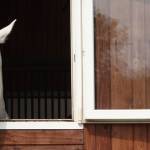Risk Assessment: Equine Gastric Ulcers

Poor performance in athletic horses can have multiple causes, including equine gastric ulcer syndrome (EGUS). Not only can EGUS negatively impact training and competition outcomes, these lesions contribute to decreased appetite, weight loss, and colic. Does your horse have EGUS? Is he at risk? If so, what can be done?
EGUS includes ulcers found in either the glandular (lower) or the squamous (higher) stomach. Ulcers in those regions are referred to as equine glandular gastric disease (EGGD) and equine squamous gastric disease (ESGD), respectively.
Estimates on the prevalence of gastric ulcers indicate:
- Warmbloods (47%) and sport ponies (35%) appear to suffer EGGD more commonly than other breeds;
- ESGD occurs more common in Standardbreds than EGGD, with between 58% and 100% of evaluated horses affected; and
- Just over half of Thoroughbreds in active training have EGGD; however, ESGD is far more common, with up to 93% having ESGD. In that population, ESGD, but not EGGD, worsened with additional training (2-3 months).
“Far more information on the occurrence and risk factors associated with ESGD exists, which leaves owners of EGGD horses with a knowledge gap. This holds particularly true for sport horses, including jumpers,” explained Kathleen Crandell, Ph.D., a nutritionist for Kentucky Equine Research.
To shed some light on EGGD in show horses, a Canadian-based research team recently examined 83 warmblood jumpers actively training and competing. Horses underwent gastroscopy to visualize the glandular region of the stomach; owners and trainers were surveyed on management practices. The researchers reported:
- About 70% of horses had EGGD grade ≥1/4 (on a scale of 1-4), and 50% of horses had more severe EGGD, grade ≥2/4;
- Exercising six or seven days per week increased the odds of EGGD; and
- Actively showing increased the risk of EGGD, yet competing at the international level surprisingly decreased the odds of EGGD.
“Based on this study and previously reported data, Warmblood horses appear to suffer from EGGD more commonly than other horses. That said, whether the increase in EGGD is associated with discipline-specific management factors or a genetic breed predisposition remains to be determined,” relayed Crandell.
It is unknown if management strategies that generally work for horses with ESGD will have the same effectiveness for horses diagnosed with EGGD.
“Gastric health starts with a balanced diet rich in forages and appropriate feeding schedules. In at-risk horses being treated with omeprazole, consider supplementing with Triacton,” said Crandell.
A recent study investigating the impact of omeprazole administration on calcium digestibility found a decrease in calcium digestibility in horses administered omeprazole. However, the calcium source in Triacton was less influenced by omeprazole compared to calcium carbonate (limestone). This finding makes Triacton a beneficial adjunct to omeprazole administration in horses.
For horses that are not being treated with omeprazole, choose RiteTrac for stomach health. RiteTrac is a proprietary blend of ingredients designed to support total digestive tract health. Targeted to benefit the stomach and the hindgut of the horse, RiteTrac works in two distinct ways. First, with its combination of fast-acting antacids and coating agents, RiteTrac quickly neutralizes excess gastric acid, protecting the stomach lining and restoring the normal gastric environment. Second, RiteTrac contains EquiShure, a time-released hindgut buffer designed to act in the cecum and colon by maintaining optimal pH, thereby reducing the risk of hindgut acidosis.
Horse owners in Australia should look for these research-proven products.
*Pedersen, S.K., A.E. Cribb, M.C. Windeyer, et al. 2018. Risk factors for equine glandular and squamous gastric disease in show jumping Warmbloods. Equine Veterinary Journal 50(6):747-751.








